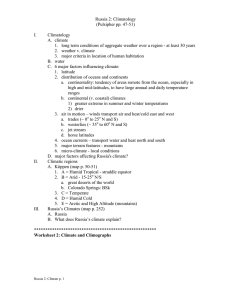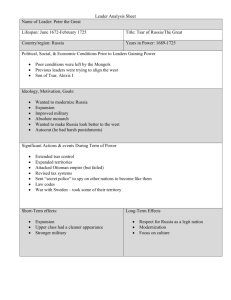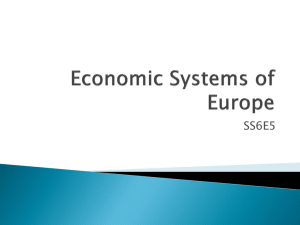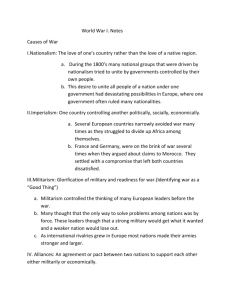Senate Committee on Foreign Relations Chairman Richard G. Lugar
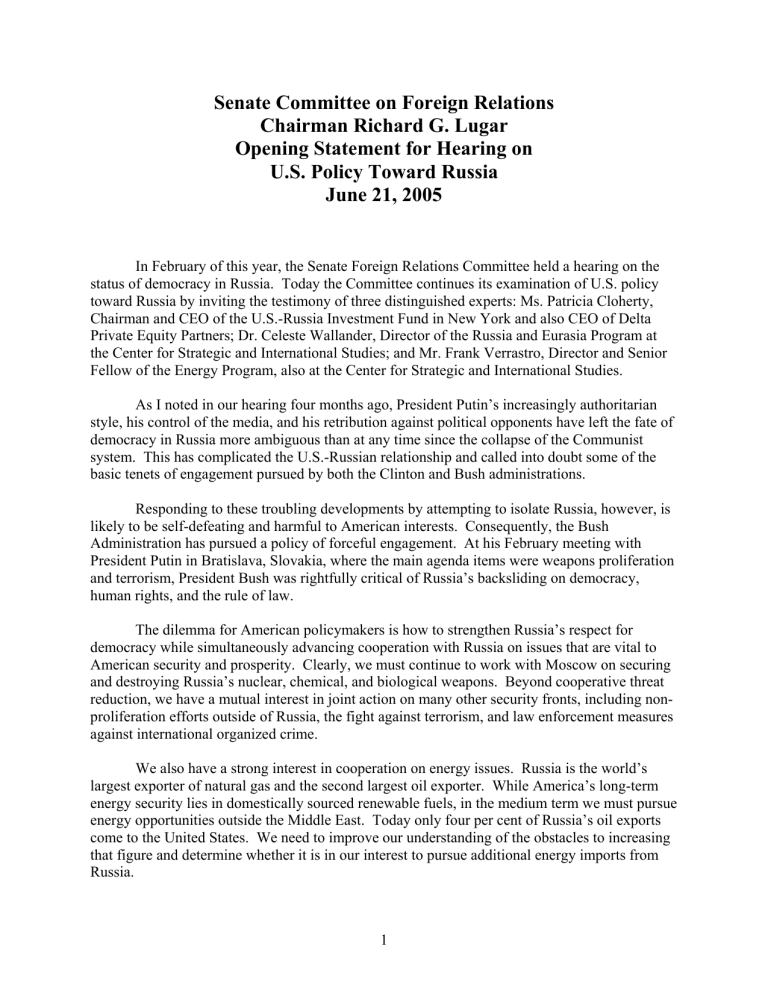
Senate Committee on Foreign Relations
Chairman Richard G. Lugar
Opening Statement for Hearing on
U.S. Policy Toward Russia
June 21, 2005
In February of this year, the Senate Foreign Relations Committee held a hearing on the status of democracy in Russia. Today the Committee continues its examination of U.S. policy toward Russia by inviting the testimony of three distinguished experts: Ms. Patricia Cloherty,
Chairman and CEO of the U.S.-Russia Investment Fund in New York and also CEO of Delta
Private Equity Partners; Dr. Celeste Wallander, Director of the Russia and Eurasia Program at the Center for Strategic and International Studies; and Mr. Frank Verrastro, Director and Senior
Fellow of the Energy Program, also at the Center for Strategic and International Studies.
As I noted in our hearing four months ago, President Putin’s increasingly authoritarian style, his control of the media, and his retribution against political opponents have left the fate of democracy in Russia more ambiguous than at any time since the collapse of the Communist system. This has complicated the U.S.-Russian relationship and called into doubt some of the basic tenets of engagement pursued by both the Clinton and Bush administrations.
Responding to these troubling developments by attempting to isolate Russia, however, is likely to be self-defeating and harmful to American interests. Consequently, the Bush
Administration has pursued a policy of forceful engagement. At his February meeting with
President Putin in Bratislava, Slovakia, where the main agenda items were weapons proliferation and terrorism, President Bush was rightfully critical of Russia’s backsliding on democracy, human rights, and the rule of law.
The dilemma for American policymakers is how to strengthen Russia’s respect for democracy while simultaneously advancing cooperation with Russia on issues that are vital to
American security and prosperity. Clearly, we must continue to work with Moscow on securing and destroying Russia’s nuclear, chemical, and biological weapons. Beyond cooperative threat reduction, we have a mutual interest in joint action on many other security fronts, including nonproliferation efforts outside of Russia, the fight against terrorism, and law enforcement measures against international organized crime.
We also have a strong interest in cooperation on energy issues. Russia is the world’s largest exporter of natural gas and the second largest oil exporter. While America’s long-term energy security lies in domestically sourced renewable fuels, in the medium term we must pursue energy opportunities outside the Middle East. Today only four per cent of Russia’s oil exports come to the United States. We need to improve our understanding of the obstacles to increasing that figure and determine whether it is in our interest to pursue additional energy imports from
Russia.
1
Economic investment is an area that shows promise, as well as peril. Russia’s economy, thanks to the boom in energy prices, has grown about seven per cent in each of the past two years. Behind this overall growth rate are pockets of prosperity and investment opportunities, such as retailing, but also sectors that suffer from corruption and too much government control.
American investors have been cautious given the government confiscation of some businesses and the harsh treatment afforded some of Russia’s own businessmen. Our commercial relations are also encumbered by the continuing problem of copyright piracy in Russia.
We also should be working with the Russians to place prevention and treatment of
HIV/AIDS higher on their national agenda. Many health experts consider Russia to be part of a
“second wave” of countries - including India, China, Nigeria, and Ethiopia – that are on the verge of suffering an HIV/AIDS epidemic. Experts estimate that 700,000 to 1 million people living in Russia have HIV/AIDS. There are indications that the disease is beginning to spread beyond sex workers and drug users to the general population, especially young people. A comprehensive response should be implemented now in order to stave off an HIV/AIDS crisis in
Russia that could have grave human and political consequences.
Our panel today is particularly well suited to help the Committee sort through the policy implications of these complex issues, and we look forward to their insights.
###
2


